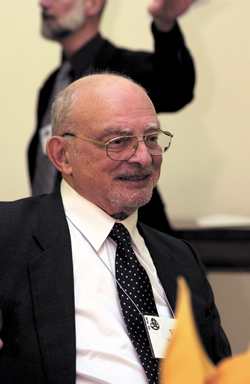


 |
Issue Contents :: Feature :: Justice For All :: Page [ 1 2 3 ]
The conference, as Kahn noted, also brought back alumni who don't regularly attend class reunions. "Here, even if you don't know anyone personally, at least you have a similar interest," he said.
 |
Victor Stone '42, professor emeritus of law at the University of Illinois. |
Similar interests, yes; identical perspectives, most certainly not. The zealous advocacy that makes the legal world revolve was on stage at Oberlin, perhaps most vividly in a panel on tort reform. High dollars equals high stakes, and the alumni panelists knocked heads thoroughly.
Corporate attorney Joel Feldman '74, for example, a government and religion major while at Oberlin, works in the class action defense group of Sidley Austin Brown & Wood in Chicago. He has served as lead defense counsel in more than 45 class actions involving insurance and financial services cases. On several high-profile occasions, he has blocked a plaintiff's efforts to get a class action certified. That's an accomplishment with potentially huge stakes, as it confines a lawsuit to a relative handful of plaintiffs, as opposed to thousands.
"There are significant business, policy, and fundamental fairness issues at stake here," Feldman said, charging that the proliferation of billion-dollar class action cases "undermines the heart and soul of the American justice system."
Like any lawyer worth his salt, Feldman can summon a parade of situations that are egregious enough to sway any mind, such as the two large auto insurance companies in Texas that settled a class action lawsuit for $36 million. Individual consumers received refunds of about $5.50; the lawyers collected $11 million. Or Blockbuster, which settled a class action case involving late video rental fees by offering small savings coupons to customers. The lawyers' take? $9.25 million.
Feldman denounced in particular the form of "legal forum shopping" that has brought many class action cases to locations such as Madison County, Illinois. There, attracted by plaintiff-friendly judges and mind-boggling awards (such as a $10 billion judgment against Philip Morris), the number of class action lawsuits is soaring. Two such cases were filed in Madison County in 1998. In 2000, there were 39. By last year, there were 106.
One reasonable reaction, said Feldman, would be for Congress to pass the so-called Class Action Fairness Act. The bill, which gained passage by the House of Representatives last year but still falls one vote short in the Senate, essentially would steer more class action cases into the stricter confines of federal court. The basic idea is that federal courts should take over when a case's plaintiffs come from different states.
But beware, retorts Paul Rheingold '55.
"Tort reform may sound very nice to you," Rheingold said, "but tort reform is really a covert action on the behalf of certain business interests."
Rheingold, a government major at Oberlin and a graduate of Harvard Law School, literally wrote the book on class action lawsuits. Mass Tort Litigation is informed by his own experience in cases involving the Dalkon Shield, diet pills, and more. When corporations "put profit and sales above public safety," Rheingold said, class action lawsuits can be the most efficient means of setting things right.
For that very reason, influential members of the state and federal judiciary and organizations such as the American Lung Asso-ciation, the American Heart Association, and the Consumers Federation of America all oppose the Class Action Reform Act, he said. Moving such cases to the increasingly crowded federal courts will only delay justice, some fear. Groups such as the Lawyers Committee for Civil Rights further contend that removing cases from state courts will take decisions out of the hands of minority and low-income jurors.
Next Page >>